The market for products based on alternative proteins is booming. Whether flexitarian, vegetarian or vegan, more and more people are choosing these foods for reasons of sustainability. What could be more obvious than to also opt for a more sustainable solution when looking for the right packaging? Here is a short overview of modern, safe, and in many cases resource-saving innovations from the packaging industry.
Booming market
Alternative proteins are among the major current food trends. More and more people are vegan, vegetarian or at least occasionally try to do without meat. Above all, the numerous flexitarians, who consciously reduce their meat consumption in order to eat more sustainably, are driving the demand for products from this category upwards, hence allowing the market for plant-based alternatives to boom. The ProVeg Plantbased Food Sector Report from 2021 shows current figures according to which sales of plant-based products in German supermarkets increased by 97% in a two-year period (source: www.proveg.com/de/pflanzlicher-lebensstil/vegan-trend-zahlen-und-faktenzum- veggie-markt). The analysis also revealed that around 45% of the flexitarians would like to have a larger selection of plant-based products on the supermarket shelves.
Food manufacturers are doing their utmost to meet this consumer demand. Plant-based meat and sausage alternatives, not so long ago still a niche product, are now available at every retailer. Europe is one of the largest and fastest growing markets for meat alternatives: between October 2019 and September 2020, supermarkets turned over € 357 million with meat substitutes, just over half of which came from vegan products. As a reason for changing their eating habits, many consumers name more animal welfare, the desire for healthier food, but also the positive impact on the environment, which includes more sustainable use of resources and slowing down climate change. The global plant-based meat market size was valued at approximately € 5 billion in 2021 and is expected to grow at a compound annual rate of 19.3% from 2022 to 2030 (source: www.grandviewresearch.com/industry-analysis/plant-based-meat-market).
As a result, alternative proteins are gaining more shelf space. This also raises the question about optimal packaging, which ideally combines maximum product protection, process reliability, convenience and attractiveness with more sustainability. Packaging specialist SEALPAC, worldwide supplier of high-tech traysealers and thermoformers, has been dealing with this question intensively for a long time. The need of its customers for such packaging solutions is increasing rapidly.
As little plastic as possible, as much as necessary
In designing sustainable solutions, it is important not to forget the original function of packaging, which is to protect the product to keep it fresh for longer. By contributing to less food waste, we also support the environment. This is why our motto can only be: as little plastic as possible, as much as necessary. Under this motto, in close cooperation with customers, as well as with material suppliers, a number of innovations have recently emerged for alternative proteins that are designed to provide optimal product safety and to prevent food waste. At the same time, these solutions have been developed to make packaging materials and processes as resource efficient as possible.
TraySkin®: premium protection for vegan eggs
A true innovation on the alternative protein scene, and only recently on the market at Migros in Switzerland, are plant-based eggs. Just like the hard-boiled version of their animal counterparts, they consist of two masses whose main components are soy proteins. They also keep up with the hen’s egg in terms of appearance, but are particularly sensitive. Here, TraySkin® technology developed by SEALPAC offers reliable protection. Furthermore, each product is individually sealed with SEALPAC’s OnTrayCut system, which was specially developed for the vacuum skin packaging process. In this way, each of the ‘eggs’ is well protected and retains its freshness over the entire shelf life. In short: a real novelty on the market!
Paper-based trays: less plastic, more sustainability
Anyone who packs products, such as vegan minced meat, cevapcici or plant-based burgers, and who wants to impress its target group by conserving resources can opt for solutions with a high proportion of fibre and less plastic. To ensure that these sensitive products based on alternative proteins are packaged reliably and in a resource-saving way, Jaun Neoform GmbH in Germany determined a number of key requirements. First, to allow for recyclability, mono-material is recommended for the plastic content. Second, the top film requires a hermetic seal, but at the same time it must be ensured that the different components can be easily separated after use for recycling purposes. Third, the new, sustainable tray requires a sealing edge of the same quality as that of conventional MAP trays to ensure product safety. Last but not least, the tray should be suitable for denesting and fully automatic packaging, despite being lighter.
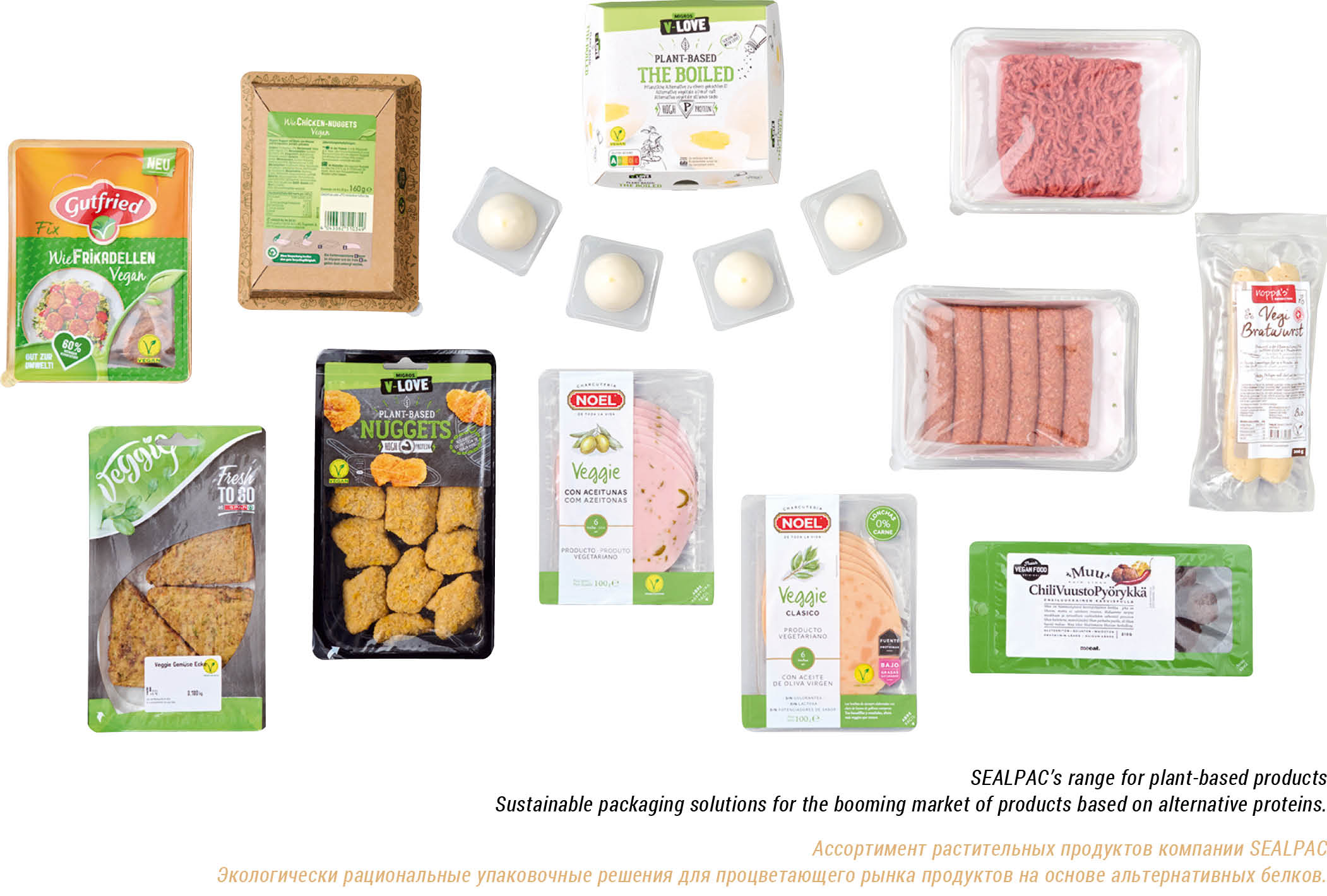
Together with SEALPAC, Jaun Neoform was able to develop a plastic-reducing tray for Modified Atmosphere Packaging that combines all these properties. This so-called eTray® consists of a cardboard base that can be printed on both sides with high-quality inks and varnishes. It has a thin plastic inlay that purely provides the sealing and barrier function. Mono-materials (mono-PP or mono-PET) ensure excellent recyclability of this plastic component. The stable and reliable tray, which is sealed under MAP, reduces the plastic content by up to 40% compared to conventional trays. After use, the cardboard carrier and plastic inlay are easily separated to allow for sustainable disposal and recycling. eTray® is suitable for many different fresh products and, by using monomaterials instead of APET, offers a resource-saving alternative that meets the latest retail guidelines. Other SEALPAC partners for this kind of hybrid tray include Halopack®, Jospak® and PackAlim®, who have solutions based on the same principle in their range.
FlatSkin®: turns products into stars at retail
There is also a packaging solution for plant-based burgers that not only provides product safety, but offers a particularly attractive appearance with minimal use of plastic. FlatSkin® is the name of this system developed by SEALPAC, in which the product is skin packaged onto a flat cardboard carrier, which is laminated with an ultra-thin polymeric layer. This means that patties can be presented in a visible and attractive way, even if displayed in a vertical position at retail.
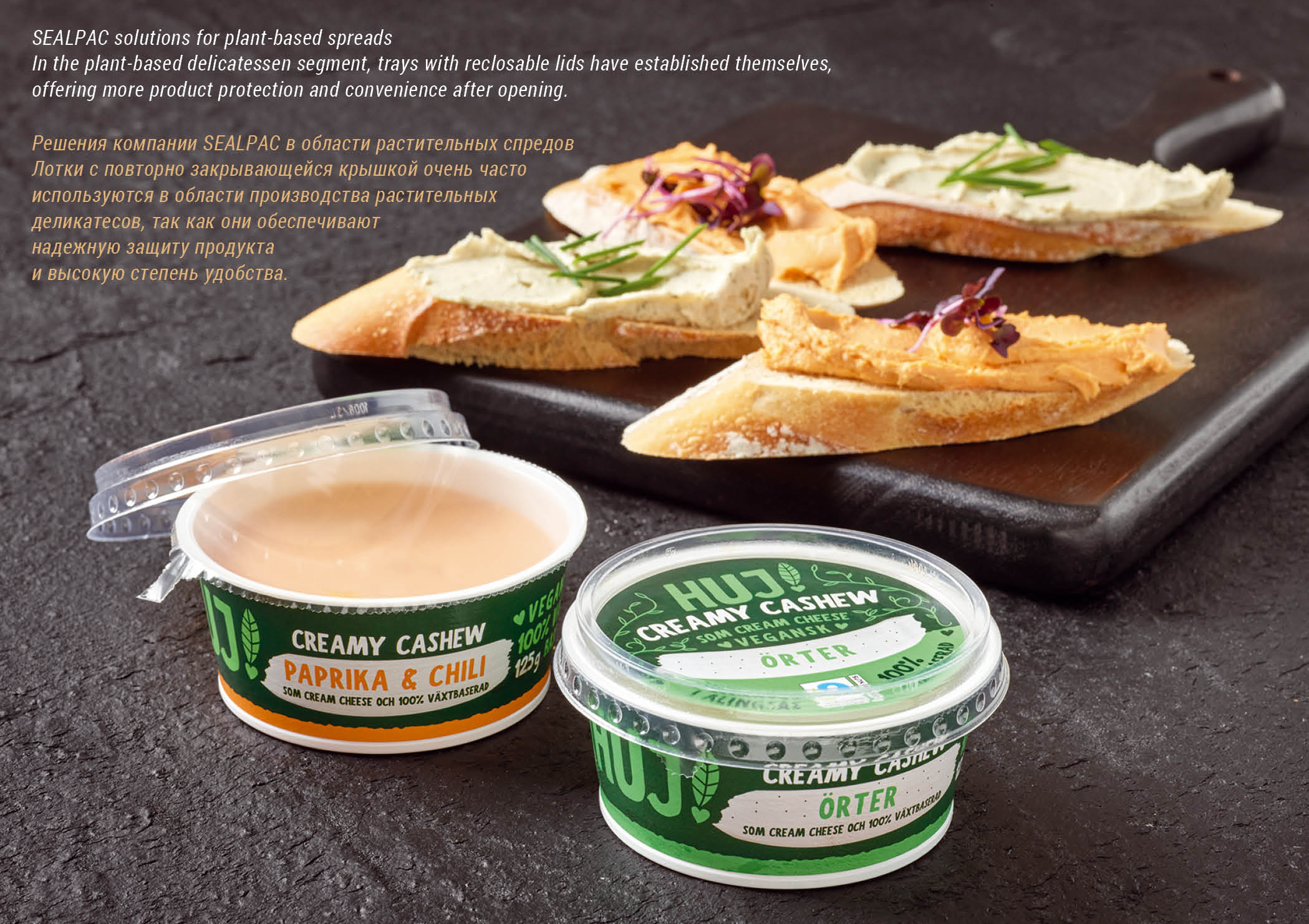
The cardboard carrier with liner uses up to 75% less plastic. It is significantly flatter and lighter than conventional product carriers and consists of a high percentage of renewable raw materials. The liner can afterwards easily be removed from the cardboard carrier by means of a special peel tab, to allow for separate disposal and recycling. This makes FlatSkin® highly convincing from an ecological point of view. In addition, the ability to print the cardboard carrier on both sides opens up excellent branding opportunities and makes it possible for manufacturers to provide their customers with information about the product, packaging and its disposal.
Vegan cold cuts: appetizingly presented with FlatMap®
A real innovation on the packaging market is FlatMap®, ideally suited for packaging of vegan cold cuts in an attractive and sustainable manner. As with FlatSkin®, a flat cardboard carrier laminated with an ultra-thin layer of plastic is used here. The product is sealed under modified atmosphere with a highly transparent top film, which can be easily removed from the cardboard. Afterwards, the film can be placed over the product again, where the edges are pressed against the carrier to provide excellent reclosability. Supported by an attractive design, the sliced products are ready to serve from their packaging.
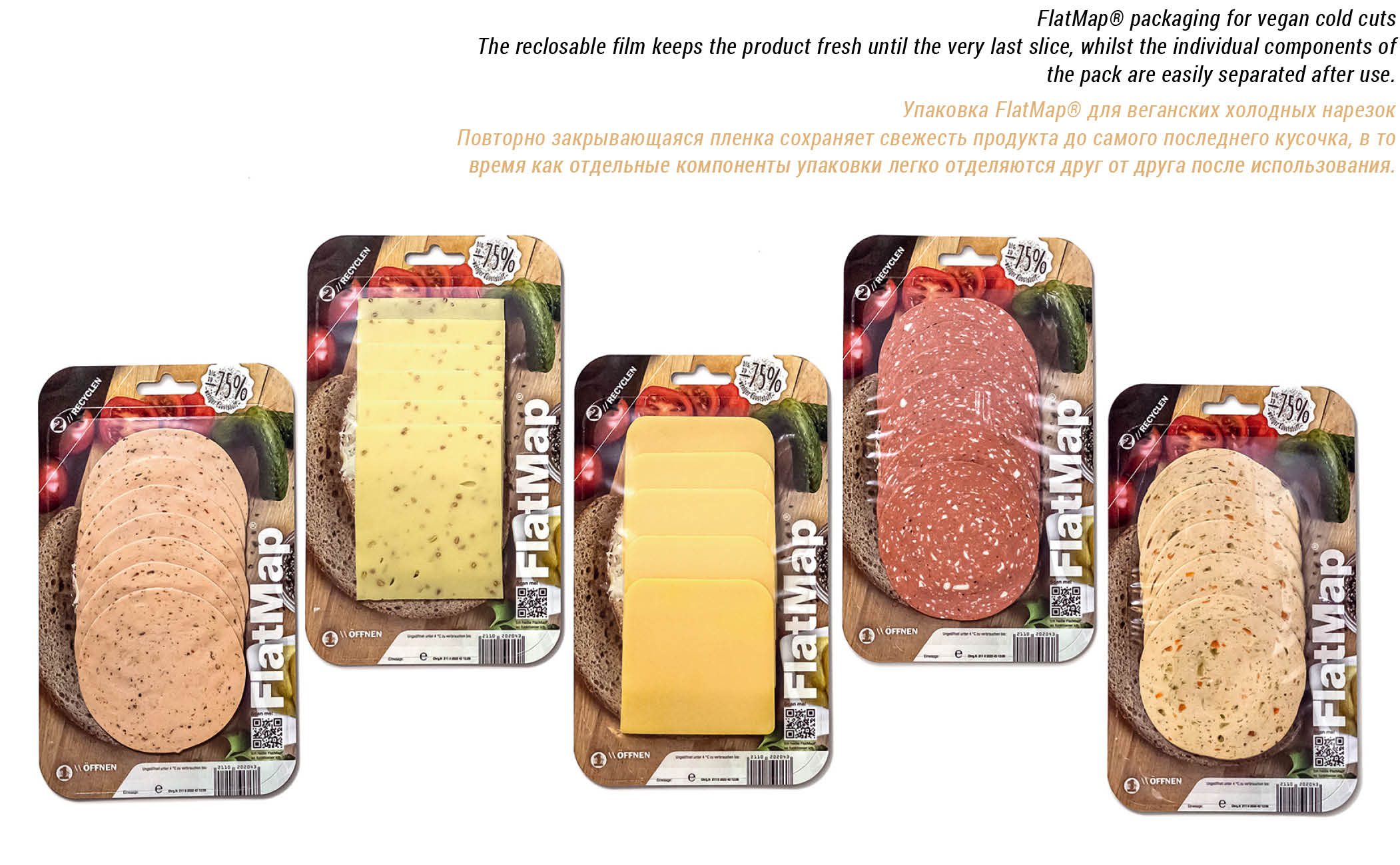
Due to the tight-fitting top film, the packaging contains less oxygen than conventional packaging systems. This has a positive effect on product quality, for example prevents the product from drying out. As a result, the cold cuts remain fresh and appetizing, right down to the very last slice. FlatMap® ensures a striking presentation at retail and encourages recycling. After use, it is possible to completely separate the plastic and cardboard components, therefore allowing full recyclability of these materials.
Trays with lids: optimal convenience, now also sustainable
In the delicatessen segment, trays with reclosable lids are well established, offering both product protection and convenience. They create a safe and attractive solution for vegan spreads, such as hummus or guacamole. Here, the SealCup® system, specially designed for oxygen-sensitive spreads by applying SEALPAC’s MAP+ technology, achieves optimal residual oxygen values below 0.3%. This enhances the product’s shelf life and retains their colour.
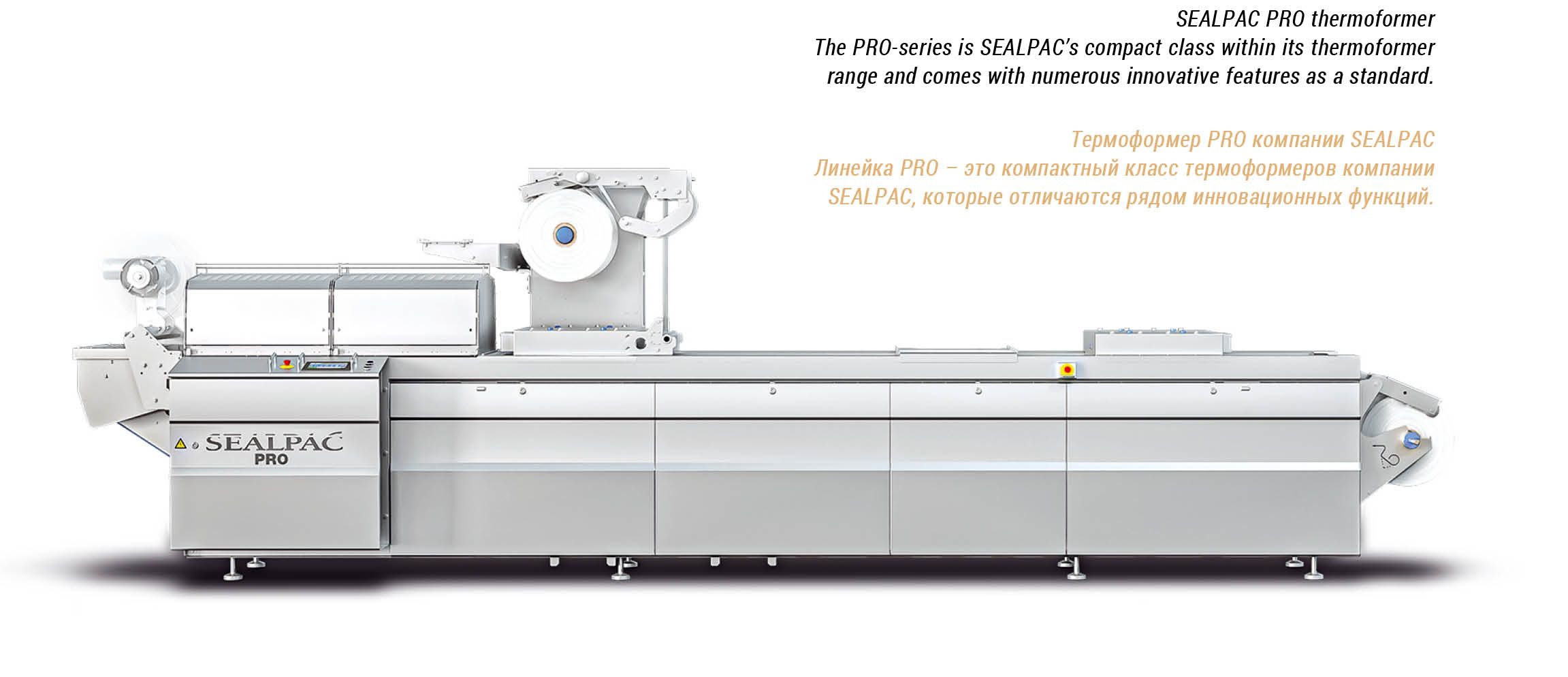
Today, the EasyLid® system, developed by SEALPAC in close cooperation with Naber Plastics in The Netherlands, makes it possible to create a lid functionality without requiring an actual snap-on lid. All you need is an EasyLid® tray and top film. This solution combines an injection-moulded tray, produced by Naber Plastics, with a unique tray-sealing technology by SEALPAC. The tray has a common sealing edge, as well as an additional ring. A peelable seal is applied to the regular sealing edge, whereas the additional ring is hermetically sealed in the same process. Upon opening the tray, the lid function is automatically activated. EasyLid® uses significantly less material than comparable packaging. Furthermore, it saves on transport and storage costs whilst reducing CO² emissions.
Naber Plastics uses 100% polypropylene (PP) for the pre-made EasyLid® trays, so that the pack can be easily recycled after use. This goes hand in hand with a whole range of other advantages. As no additional lidding system is required, less personnel and less floor space is needed. At the same time, the system contributes to more sustainability by reducing plastics and food waste.
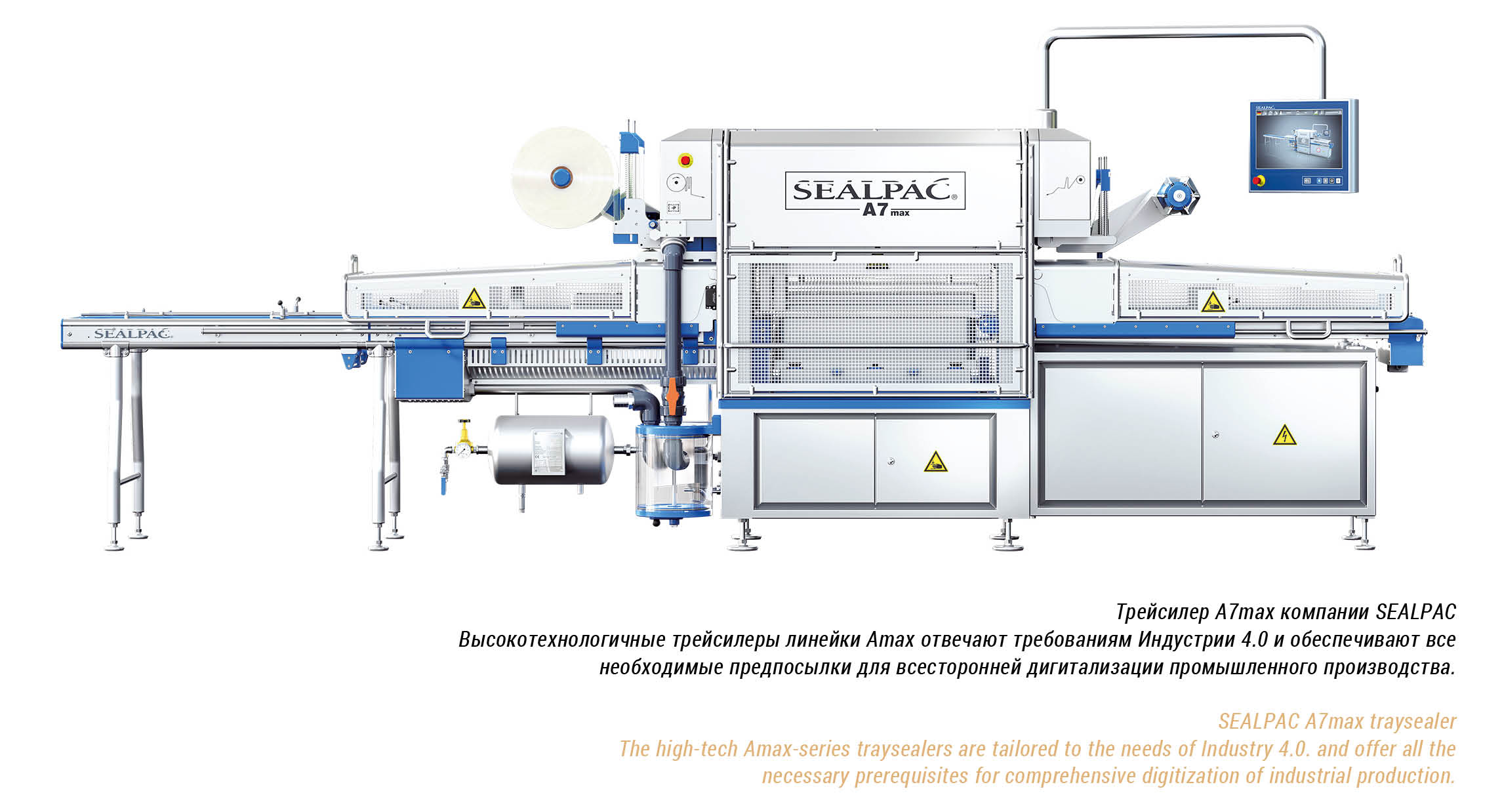
Flexible packaging: efficient and functional, but also recyclable
In order to package products based on alternative proteins more sustainably, one does not always require ground-breaking developments. The best example is classic flexible film vacuum packaging. This standard thermoformer pack, made of flexible top and bottom film, is a cost-effective solution for products packaged under vacuum. For a long time already, this solution stands for maximum product protection and optimal shelf life of fresh food. Depending on the film used, it is also suitable for post-pasteurized products. Flexible film packaging is ideal for vegan sausages, among other things. If you replace conventional, multi-layer materials with modern, flexible films made of monomaterials, you can create a recyclable packaging concept. This requires highperformance thermoformers, such as the SEALPAC PRO-series, which reliably process the latest mono-films.
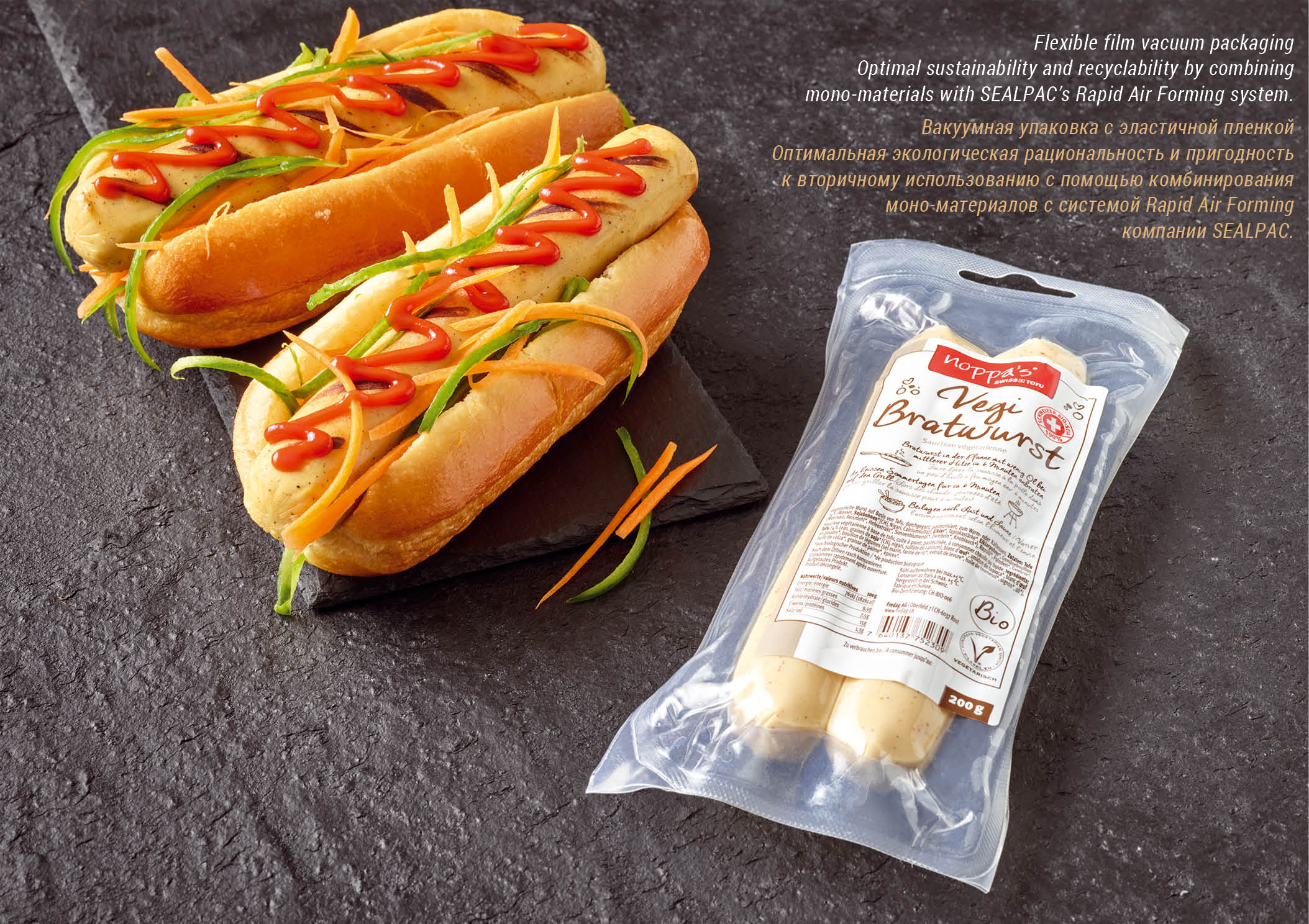
Always remember: less is more
With the innovative packaging solutions mentioned before, customers are able to combine maximum product safety and optimal shelf life with an attractive appearance and increased environmental protection. However, it is also possible to achieve more sustainability when using conventional packaging systems, which have been established for many years already. For example, SEALPAC thermoformers, regardless of whether it concerns the PRO- or RE-series, always work with the unique Rapid Air Forming system, which enables the use of thinner films, and thus ensures a more sustainable use of materials. If, in addition, mono-materials are used, which are easy to recycle, more resource conservation can be achieved for classic thermoformer packaging. Not just for trendy products, such as plant-based proteins, but in any product segment.

